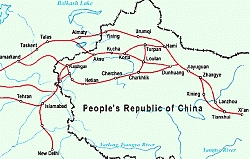Pakistan supports New Silk Road being built by China

Islamabad – Pakistan announced official support for News Silk Road being built by China. Pakistan’s Ambassador to China Masood Khan said that his country will be glad to see more “Silk Roads” being built in the region to ensure common development as well as peace, stability and prosperity for their people.
According to Pakistan’s Foreign Office, while discussing the prospect of reviving a trade route across the vast Eurasian land, at the ongoing second China-Eurasia Expo in Urumqi, Pakistan supports the on-going efforts to expand the silk roads.
Seventeen state-level open ports, two international airports and extensive roads and railways link the landlocked Xinjiang, China’s westernmost region, to the country’s neighbors to the west. The second cross-border railway between China and Kazakhstan has been linked up and the China-Kyrgyzstan-Uzbekistan highway will soon be launched in full.
China’s New Silk Road is based on three main corridors across the Eurasian continent, called the Eurasian Land Bridge, which serves as the main arteries from which offshoot rails, highways, and pipelines will be built. The first one is the existing Trans-Siberian Railway running from Vladivostok in Eastern Russia to Moscow and connecting to Western Europe and Rotterdam; the second runs from Lianyungang port in Eastern China through Kazakhstan in Central Asia and onto Rotterdam; and the third runs from Pearl River Delta in Southeast China through South Asia to Rotterdam. This part one can call the emerging North-South corridor concept of India, Iran, and Russia. China has almost entered its second main arteries by connecting it with Kazakhstan via its expressway that China is calling the New Silk Road.
There is a major difference between the US-sponsored New Silk Road and the China project. China has totally left out Afghanistan from its project, thinking that this land will remain unstable, while the US project stands on the foundation of promoting Afghanistan and linking developments in South Asia and Central Asia through Afghanistan even at the expense of Tajikistan, Pakistan, Uzbekistan, India, and Turkmenistan. The United States is insisting Pakistan and India get natural gas from Turkmenistan through Afghanistan instead of getting natural gas from Iran through Pakistan to India. It is also insisting Pakistan get electricity from Tajikistan through Afghanistan. For the US, all roads lead to Kabul, but China plans for all roads to lead directly to Central Asia, leaving Afghanistan aside. The United States’ New Silk Road left out Iran due to obvious reasons, while the original Silk Road had Iran as its greatest component, with Afghanistan as on/off shoot of original Silk Road.
US Congress issued and updated The Silk Road Strategy Act to maintain US influence in Eurasia, while the Chinese Communist Party (CCP) released its concept of its Silk Road as a Eurasian Land Bridge connecting China to Europe across the Eurasian continent.
In the past, representatives from 40 countries participated in a two-day Ministerial Conference on Transport, sponsored by UNESCAP. China, Indonesia, Laos, Korea, Cambodia, Russia, Turkey, Azerbaijan, Armenia, Kazakhstan, Iran, and others designed the 81,000 kilometer railway network linking 28 countries through tracks and ferry routes to boost Asia’s economic development and establish a direct route to European markets. The plan is to develop routes between Asian countries, then expand them to its central neighbors, and to Europe. This was actually a blueprint of the China New Silk Road.
In January 2008, China, Mongolia, Russia, Belarus, Poland, and Germany implemented the first corridor of the Eurasian Land Bridge and agreed to create conditions to pave the way for regular container train service between Europe and Asia. A demonstration container train dubbed “The Beijing-Hamburg Container Express,” carrying a load of Chinese goods, rolled out of one of the logistics bases of the China Railway Container Transport Corp Ltd.
The train covered 10,000 kilometers (6,200 miles) in 15 days, crossing China, Mongolia, Russia, Belarus, and Poland before arriving in Hamburg, Germany. By comparison, sea transport adds 10,000 kilometers to the journey through the Indian Ocean, and would have taken 40 days to ship goods from China to Germany – more than double the time to send trains through the Eurasian corridor. The original Silk Road also had the component of ferries, as does the New Silk Road of China. Source: thekooza.com















